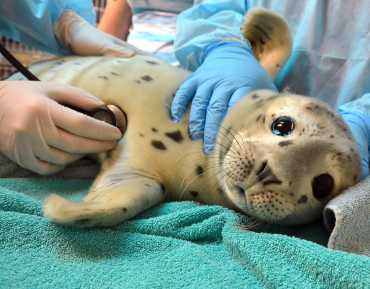
A Statement In Response to Columbia River Basin Sea Lion Cull
The Marine Mammal Center is deeply disappointed by the renewed permit authorizing the lethal removal of sea lions in the Columbia River basin as announced last week by the Oregon Department of Fish & Wildlife. Killing sea lions will not result in salmon recovery, nor will it result in the recovery of the steelhead trout population.
The environmental and human-caused conditions that threaten the survival of these fish populations took generations to create. It will take many years and bold action by individuals and communities, informed public policy and the coordinated effort of many stakeholders to reverse this. Yet, year after year, officials fall back on an easy scapegoat instead: sea lions.
The Marine Mammal Center is committed to addressing this issue by empowering the public to make choices to protect people, animals and the ecosystem. One of the key drivers of the salmon decline is environmentally-harmful dams of the Lower Snake River. While the use of carbon-free electricity is laudable, not all forms of renewable energy are environmentally-friendly in every context.
With prices dropping significantly for solar and wind energy, it is possible to support the energy demands of the community with renewable energy sources, a plan with more long-lasting impact than culling, while eliminating the dams and returning the Snake River to the prolific salmon habitat of its past. Such a plan would require significant coordination and effort on the part of many stakeholder groups, yet would yield results that would offer true remedies for decades to come.
The Marine Mammal Center supports individuals and communities in finding climate solutions that work for both people and the environment. The Center provides innovative educational programs that address these topics and its experts serve in leadership roles and participate in community-supported collaboratives around the country such as the National Network for Ocean and Climate Change Interpretation and the North American Association for Environmental Education.
Learn More
{"image":"\/Animals\/Wild\/Other species\/whale-with-oil-rig-shutterstock.jpg","alt":"whale feeding with oil rig in background","label":"Conservation","title":"Climate Change","link_url":"\/science-conservation\/conservation\/climate-change","type":"page"}

{"image":"\/Animals\/Wild\/California sea lion\/csl-underwater-shutterstock.jpg","alt":"California sea lion underwater","label":"Pinnipeds","title":"California Sea Lion","link_url":"\/animal-care\/learn-about-marine-mammals\/pinnipeds\/california-sea-lion","type":"page"}

{"image":"\/Animals\/Wild\/Steller sea lion\/cropped-images\/steller-sea-lions-on-rocks-shutterstock-0-730-4608-2125-1605062277.jpg","alt":"Steller sea lions on a rock","label":"Pinnipeds","title":"Steller Sea Lion","link_url":"\/animal-care\/learn-about-marine-mammals\/pinnipeds\/steller-sea-lion","type":"page"}

Protecting endangered species, including fish populations, is critical to healthy ecosystems, but the use of lethal force to prevent sea lions from preying on fish populations – their very natural behavior – is not an effective long-term conservation tactic. The Marine Mammal Center strongly disagrees with and opposes the use of lethal force to prevent California and Steller sea lions from preying on fish populations.
Despite overwhelming public opposition against this plan, not only was the federal permit renewed, but greatly expanded. The new policy inflates not only the numbers of the sea lions that can be killed, but is now indiscriminate to both California sea lions and Steller sea lions, the local population only recently de-listed from the Endangered Species List.
Compared to previous years where specific animals had been identified as key disruptors to salmon mortality, this new policy allows for the killing of any sea lion within nearly 200 miles of the salmon, regardless of the time of year and without any justification beyond their simple existence.
The policies and decisions made over many years have led us to an imbalance in the ecosystem. The solution to this imbalance is not killing sea lions, but focusing on long-term solutions that address the contributing factors to the decline in fish populations, including habitat impacts from dam construction, commercial and recreational fishing practices, climate change and consumer demand and choice.
Read more about this policy in the official Oregon Department of Fish & Wildlife press release.
For more information or to set up an interview on this topic, please contact us at media@tmmc.org.
Header image: photo © Sylvia Hunt
Yes, I want to save a life!

Yes, I want to save a life!
You’ll be giving sick and injured animals the best possible care at the Center’s state-of-the-art hospital. With your gift today, you are giving a patient a second chance at life in the wild.
See Our Latest News
{"image":"\/Animals\/Wild\/Gray whale\/cropped-images\/two-gray-whales-golden-gate-bridge-shutterstock-0-0-1270-992-1770234810.jpg","alt":"two gray whales under the Golden Gate Bridge","title":"The Marine Mammal Center and San Francisco Harbor Safety Committee Pilot New Vessel Operator Training Program","link_url":"https:\/\/www.marinemammalcenter.org\/news\/the-marine-mammal-center-and-san-francisco-harbor-safety-committee-pilot-new-vessel-operator-training-program","label":"Press Release","date":"2026-02-06 01:00:00"}

The Marine Mammal Center and San Francisco Harbor Safety Committee Pilot New Vessel Operator Training Program
February 6, 2026
Read More{"image":"\/Animals\/Wild\/Bottlenose dolphin\/cropped-images\/dolphinphoto-by-adam-li-c-noaa-0-0-1270-992-1769539954.jpg","alt":"A bottlenose dolphin jumps out of the water.","title":"What\u2019s the Difference Between Dolphins and Porpoises? And Other Animal Trivia","link_url":"https:\/\/www.marinemammalcenter.org\/news\/whats-the-difference-between-dolphins-and-porpoises-and-other-animal-trivia","label":"News Update","date":"2026-01-26 23:00:00"}

What’s the Difference Between Dolphins and Porpoises? And Other Animal Trivia
January 26, 2026
Read More{"image":"\/Animals\/Patients\/Sea otters\/2025\/cropped-images\/so-mooring-release-2-laurie-miller-c-the-marine-mammal-center-USFWS-permit-MA101713-1-147-8-1270-992-1770307740.jpg","alt":"Sea otter - Mooring","title":"Rescue Stories: Southern Sea Otter Mooring Named the 2025 Patient of the Year","link_url":"https:\/\/www.marinemammalcenter.org\/news\/rescue-stories-vote-for-your-favorite-marine-mammal-patient-of-2025","label":"News Update","date":"2026-01-16 10:05:08"}

Rescue Stories: Southern Sea Otter Mooring Named the 2025 Patient of the Year
January 16, 2026
Read More{"image":"\/People\/Action\/Veterinary care\/cropped-images\/Harris_Green turtle_TMMC-0-0-1270-992-1767649941.jpg","alt":"Heather Harris","title":"Seattle Aquarium Awards Dr. Heather Harris With Prestigious Conservation Research Award","link_url":"https:\/\/www.marinemammalcenter.org\/news\/seattle-aquarium-awards-dr-heather-harris-with-prestigious-conservation-research-award","label":"In the News","date":"2026-01-05 04:48:00"}

Seattle Aquarium Awards Dr. Heather Harris With Prestigious Conservation Research Award
January 5, 2026
Read More